香港朗文4A词汇及练习
香港朗文四年级4A第一单元达标练习题(精编文档).doc
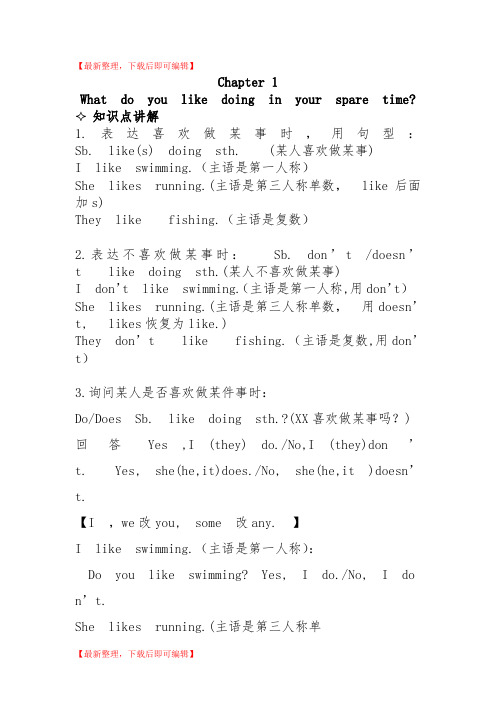
【最新整理,下载后即可编辑】Chapter 1What do you like doing in your spare time? 知识点讲解1.表达喜欢做某事时,用句型:Sb. like(s) doing sth. (某人喜欢做某事)I like swimming.(主语是第一人称)She likes running.(主语是第三人称单数,like后面加s)They like fishing.(主语是复数)2.表达不喜欢做某事时:Sb. don’t /doesn’t like doing sth.(某人不喜欢做某事)I don’t like swimming.(主语是第一人称,用don’t)She likes running.(主语是第三人称单数,用doesn’t, likes恢复为like.)They don’t like fishing.(主语是复数,用don’t)3.询问某人是否喜欢做某件事时:Do/Does Sb. like doing sth.?(XX喜欢做某事吗?) 回答Yes ,I (they) do./No,I (they)don’t. Yes, she(he,it)does./No, she(he,it )doesn’t.【I ,we改you, some 改any. 】I like swimming.(主语是第一人称):Do you like swimming? Yes, I do./No, I do n’t.She likes running.(主语是第三人称单数) Does she like running? Yes, she does./ No, she doesn’t.They like fishing.(主语是复数) Do they like swimming? Yes ,they do./N o, they don’t.4. 询问某人喜欢做什么时用特殊疑问句:What do you like doing?What does she like doing?(第三人称单数)What do they like doing?(复数)达标小练一.填空。
香港朗文4A词汇及练习
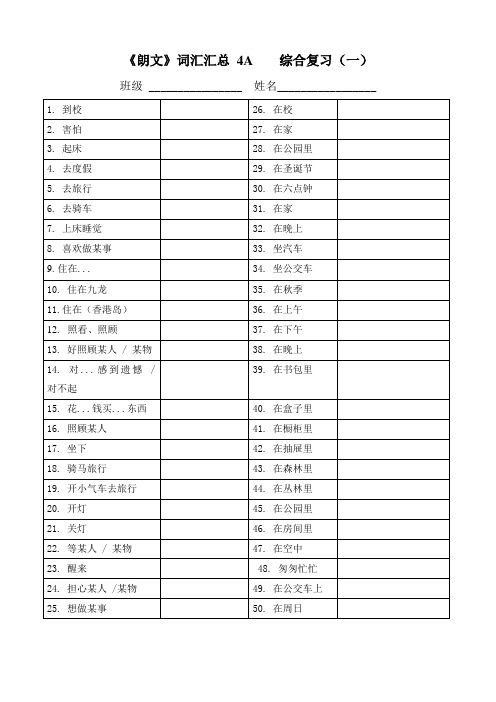
go to bed early
eat out
52. 在地板上
on the floor
71. 起床晚了
get up late
53. 在架子上
on the shelf
72. 上网
surf the Net
54. 在沙发上
on the sofa
73. 快餐
Fast food
55. 在农场上
on the farm
74. 口香糖
chewing gum
in the sky
23. 醒来
wake up
48. 匆匆忙忙
in a hurry
24. 担心某人 /某物
worry about sb / sth
49. 在公交车上
on a bus
25. 想做某事
want to do sth
50. 在周日
on Sunday
51. 在床上
on the bed
70. 外出吃饭
live in
34. 坐公交车
by bus / take a bus
10. 住在九龙
live in Kowloon
35. 在秋季
in autumn
11.住在(香港岛)
live in Hong Kong Island
36. 在上午
in the morning
13.照看、照顾
look after
37. 在下午
《朗文》词汇汇总4A综合复习(一)
班级 ________________ 姓名_________________
1. 到校
26. 在校
2. 害怕
27. 在家
香港朗文WTE 4A Chapter1 词汇 语法 知识点

4A Chapter1 背诵内容一.单词部分n.名词v.动词vt. 及物动词vi.不及动词pron. 代词prep. 介词adj. 形容词adv. 副词conj. 连词num. 数词art. 冠词interj.感叹词Part I.1.activity [ækˈtɪvətɪ] n. 活动2.spare [speə] adj. 空余的,空闲的3.roller-skate ['rəʊləˌskeɪt] vi./n. 滚轴溜冰; 滚轴溜冰鞋4.jog [dʒɒg] vi. 慢跑5.too [tu:] adv. 太;也6.either [ˈaɪðə] adv./pron. 也(否定句);(两者中)任何一个7.reply [rɪˈplaɪ] vt./vi. 回答Part II. Past form(过去式)walk—walked ask—asked reply—replied say—said draw-drew be—was/were think—thought go—went get—gotPart III. Gerund (动名词)swim—swimming jog—jogging roller-skate—roller-skating dance—dancing paint—painting listen—listening二.词组部分1.in one’s spare time在某人的空余时间2.listen to (the) music 听音乐3.play chess 下棋4.like/love/enjoy doing 喜欢干某事5.go swimming (去)游泳6.go jogging (去)慢跑7.go roller-skating (去)溜冰8.make a new friend named Tom 交了一个叫汤姆的朋友9.in fact=as a matter of fact= actually 事实上10.i n the gym 在体育馆11.i n the fitness club 在健身俱乐部12.i ndoor stadium 室内体育馆13.d ance flamingo 跳弗莱明哥14.p erform ballet 跳芭蕾15.f inish doing 完成某事/干某事16.p ractise sth./doing 练习某事/干某事17.b e good at sth./doing 擅长于某事/干某事18.b e poor at sth./doing 不擅长于某事/干某事19.b e interested in sth./doing 对干某事/干某事感兴趣20.b e afraid of sth./doing 害怕某事/干某事21.a detective story called Conan 一个叫作《科南》的侦探故事22.o ne of the most famous artists 著名的画家之一(一位著名的画家)23.a t the weekend/at weekends/on the weekend 在周末24.a middle-aged woman 一位中年妇女25.o n weekdays 在工作日,平日26.b e busy with sth. 忙于某事27.b e busy doing 忙于干某事28.b e important to sb. 对某人而言是重要的29.e njoy the fresh air and the beautiful moments 享受新鲜的空气与美妙的时光30.e njoy oneself= have a good time 某人玩得很开心31.a family helper 一位家庭帮手32.s end and pick up kids 接送小孩33.p lay the piano/violin 弹钢琴,拉小提琴(西洋乐器名词前加the )34.p lay Erhu 拉二胡(民族乐器前无the)35.p lay table tennis 打羽毛球(球类名词前无the)36.p lay on the swings/slide 在秋千(滑滑梯)上玩37.p lay with sb. 与某人一起玩38.p lay with sth. 玩耍某物39.a bit later 一会儿以后40.w alk away sadly 难过地走开了41.w alk the dog 溜狗42.w alk home=go home on foot 走回家43.g o home =go back home 回家44.g et home=arrive home 到家45.a fter that 在那以后46.t he black notes (钢琴上)黑键47.s ee sb. doing 看到某人在干某事(强调片断)三.句子部分Part I.1.What do you like doing? 你喜欢干什么?2.I like doing…,too/as well. 我也喜欢做某事。
最新香港朗文4A各单元知识要点词汇语法

最新香港朗文4A各单元知识要点词汇语法以下是最新版香港朗文4A各单元的词汇和语法要点:Unit 1: Going Places- 词汇:transportation(交通工具),destination(目的地),navigate(导航),explore(探索)- 语法:一般现在时,there is / there are句型,情态动词can的用法Unit 2: Nature's Forces- 词汇:natural disasters(自然灾害),flood(洪水),earthquake(地震),hurricane(飓风),volcano(火山)- 语法:一般过去时,情态动词must / mustn't的用法Unit 3: Materials and Properties- 词汇:materials(材料),properties(特性),solid(固体),liquid(液体),gas(气体)- 语法:现在进行时,情态动词should / shouldn't的用法Unit 4: Diverse Cultures- 词汇:diverse(多样化的),culture(文化),tradition(传统),custom(风俗),celebration(庆祝活动)- 语法:现在完成时,情态动词could / couldn't的用法Unit 5: The Arts- 词汇:artistic(艺术的),creative(创造性的),performance(表演),sculpture(雕塑),painting(绘画)-语法:一般将来时- 语法:过去进行时,情态动词may / must的用法以上是最新香港朗文4A各单元的词汇和语法要点。
请注意,这些要点可能会因版本差异而有所变化,建议参考最新教材或教师的指导。
香港朗文4A Unit1第一次课

香港朗文(Welcome to English)4AUnit1(P1-2)Topic:Knowing our friends了解我们的朋友Words: New words and phrases新词汇+动词ing形式read—reading paint—painting dance—dancing roller-skate—roller-skating阅读绘画跳舞滑旱冰jog—jogging swim—swimming play chess—playing chess listen to music—listening to music 慢跑游泳下棋听音乐Sentence:句型A: What do you like doing in your spare time?B: I like swimming, reading and listening to music.Grammar:语法1. 表达喜欢做某事时用:Sb. like doing sth.(某人喜欢做某事)2.表达不喜欢做某事时用:Sb don’t/ dosen’t like doing sth.(某人不喜欢做某事)3.询问某人是否喜欢做某件事时:Do/Does Sb. like doing sth.?(某人喜欢做某事吗?)回答:Yes ,I do./No,I don’t. Yes, she does./No, she doesn’t.I ,we改you4.I like swimming.(主语是第一人称):Do you like swimming? Yes, I do./No, I don’t.5. She likes running(主语是第三人称单数) :Does she like running? Yes, she does./No, she doesn’t.6.They like fishing.(主语是复数):Do they like swimming? Yes ,they do./No, they don’t.7. 询问某人喜欢做什么时用特殊疑问句:What do you like doing?What does she like doing?(第三人称单数)What do they like doing?(复数)(Sb. = somebody,Sth. = something)Homework: 家庭作业1.背单词+背笔记2.完成练习册P13.完成作业单练习一.填空。
香港朗文版4A-Chapter2 part A

Yes, No,
he she
surfs the Net. eats out. goes to bed late.
Practice
Sunday Monday Tuesday Wednesday Thursday Friday Saturday
Do you ever go swimming? Yes, I always go swimming.
Now listen carefully. After listening answer my question:
What is Peter good at? How do they know their friends better?
Questions:
1. Do you think Bill is a good boy or naughty boy?
A: Do you ever __________________? B: Yes/No, I ____________________.
A: Do you ever __________________? B: Yes/No, I ____________________.
A: Do you ever __________________? B: Yes/No, I ____________________.
friends
1:Who are your friends? 2.How old are your friends? 3:What do they like doing? 4. What don’t they like doing in their spare time?
playing chess
Here are some activities. Let’s talk about them.
香港朗文4A单词及句子

4A Chapter 5 Animals big and small一、四会单词horse camel giraffe owl peacock wolf penguin 马骆驼长颈鹿猫头鹰孔雀狼企鹅eagle hippo turtle rat mouse(mice)crocodile parrot 鹰河马龟老鼠(较大)鼠鳄鱼鹦鹉二、三会单词shark dolphin starfish dragonfly cockroach鲨鱼海豚海星蜻蜓蟑螂insect ant crane golden-fish eel crab昆虫蚂蚁鹤金鱼鳗鱼螃蟹三、comparatives and superlatives of Adjectives: 形容词比较级和最高级1.规则变化:2.不规则变化:四、四会句子(Sentences)The rat is smaller than the rabbit.田鼠比兔子小。
The mouse is the smallest.老鼠最小。
The camel has a longer neck than the horse.骆驼的颈比马长。
The giraffe has the longest neck.长颈鹿的颈最长。
The penguin has pretty feathers.企鹅有漂亮的羽毛。
The parrot has prettier feathers than the penguin.鹦鹉比企鹅有更漂亮的羽毛。
The peacock has the prettiest feathers.孔雀有最漂亮的羽毛。
五、Verbs:(单词过去式)meet-met speak-spoke come-came swim-swam遇见讲话到来游泳break-broke save-saved choose-chose catch-caught打破解救选择抓住become-became成为毛。
香港朗文4A单词及句子

catch-caught 抓住
become-became 成为
毛。
长颈鹿的颈最长。
The penguin has pretty feathers.
企鹅有漂亮的羽毛。
The parrot has prettier feathers than the penguin.
鹦鹉比企鹅有更漂亮的羽毛。
The peacock has the prettiest feathers.
四、四会句子( Sentences ) The rat is smaller than the rabbit.
田鼠比兔子小。
The mouse is the smallest.
老鼠最小。
The camel has a longer neck than the horse. 骆 驼的颈比马长。
The giraffe has the longest neck.
孔雀有最漂亮的羽毛。
五、 Verbs :(单词过去式)
规律: i-a
去掉一个字母:
swim
swam meet
met
sing
sang feed
fed
ring
rang shoot
shot
ought 结尾: 保持不变:
bring brought cut
cut
buy
bought put
put
fight
fought hurt
(健康的) well-better-best
(有病的) ill-worse-worst
(老的) old-older-oldest
(年长的) old-elder-eldest
(远的) far-farther-farthest
最新香港朗文英语4A第四单元知识要点 词汇语法

4A Chapter 4 背诵内容I. 音标和单词:1.hundred ['hʌndrəd] num. 一百thousand ['θaʊznd] num. 一千2.cotton ['kɒtn] n. 棉;棉布;棉织物3.silk [sɪlk] n. 丝绸;(蚕)丝;丝织物;(用于缝纫的)丝线4.horse [hɔːs] n. 马5.sedan chair [sɪ'dæn tʃeə] n. 轿子6.silver ['sɪlvə] n. 银;银色;白银,银子7.coin[kɔɪn] n. 硬币; 金属货币;8.gold [ɡəʊld]n. 金,金色,金黄色;黄金9.paper money ['peɪpə 'mʌnɪ] n. 纸币;票子;钱票10.village ['vɪlɪdʒ] n. 村庄;乡村11.town [t aʊn] n. 小镇;城镇12.content(s) ['kɒntent] n. 目录13.tunnel ['tʌnl] n. 地下通道;地道;隧道14.bridge [brɪdʒ] n. 桥;桥梁15.airport ['eəpɔːt] n. 机场16.fridge [frɪdʒ] n. 冰箱17.pigeon ['pɪdʒɪn] n. 鸽子附:Chapter 4动词过去式变化表(详见朗文P62-65总表)do-did go-went wear-wore find-foundtravel-travelled/traveled pay-paid live-livedam/is-was are-were feel-felt try-tried fall-fellwake-woke keep-kept start-startedstop-stopped look-looked say-said take-tookask-asked write-wrote can-could have-had explain-explained miss-missed give-gave want-wanted cook-cooked eat-ate drink-drank buy-bought celebrate-celebrated make-made listen-listenedII. 词组:1.five hundred years ago 五百年前ten thousand years ago 一万年前2.do a history project 做一个历史课题do a history project on life 500 years ago 做一个关于500年生活的的历史课题3.cotton clothes 棉布衣服4.silk clothes 丝绸服装5.find out 查出,发现6.ride a horse/ride horse s骑马7.travel by sedan chair 乘轿子出行8.travel by boat 乘船出行9.most people 大多数人common people 普通人,平民some people 一些人rich people 富人,有钱人10.in villages 在村庄in towns 在城镇11.pay for things 付款(购物)12.contents page 目录页13.free time 空闲时间14.make money 赚钱15.work hard 努力工作;努力学习16.cook with gas 用煤气做饭cook with firewood 用柴火做饭17.eat congee and vegetables 吃粥和蔬菜eat rice and meat 吃米饭和肉18.live in flats 住在公寓里live in simple/large houses 住在简易的房子/大房子里19.celebrate Christmas 过圣诞节celebrate Chinese New Year 过春节20.buy food at supermarkets 在超市买食品buy food at markets 在集市买食品21.life in the past 过去的生活22.dream about … 梦见……23.do one’s homework 做作业24.feel sleepy 感到困倦,发困,昏昏欲睡25.try to do sth. 尽力做某事try one’s best = do one’s best 竭尽全力26.after a while 过了一会儿27.wake up 醒来28.fall asleep 睡着asleep adj. 睡着的(反义词:awake adj. 醒着的)29.keep in touch with sb. 与某人保持联系30.be away from home 离家在外31.start to do sth. 开始做某事32.look out 往外望Look out! 当心!小心!33.ride in a sedan chair 坐轿子34.miss his own family 想家35.send letters 寄信36.by land 陆运by sea 海运by air 空运37.at the door 在门口III. 句型:1.How did they keep in touch with their families when they were awayfrom home? 离家在外的人们是怎么与他们的家人保持联系的?2.Please may I use your phone? 我能借用一下你的电话吗?I want to call my father. 我想要打电话给我爸爸。
香港朗文4A单词及句子.xls
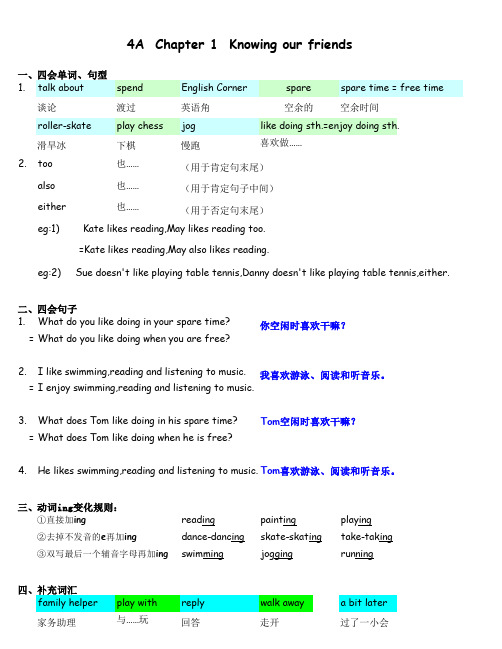
4A Chapter 1 Knowing our friends一、四会单词、句型1.talk about spend English Corner spare spare time = free time谈论 渡过英语角空余的空余时间roller-skate play chess jog like doing sth.=enjoy doing sth.滑旱冰下棋慢跑喜欢做……2.too也……(用于肯定句末尾)also也……(用于肯定句子中间)either也……(用于否定句末尾)eg:1) Kate likes reading,May likes reading too.=Kate likes reading,May also likes reading.eg:2) Sue doesn't like playing table tennis,Danny doesn't like playing table tennis,either.二、四会句子1.What do you like doing in your spare time?你空闲时喜欢干嘛?=What do you like doing when you are free?2.I like swimming,reading and listening to music.我喜欢游泳、阅读和听音乐。
=I enjoy swimming,reading and listening to music.3.What does Tom like doing in his spare time?Tom空闲时喜欢干嘛?=What does Tom like doing when he is free?4.He likes swimming,reading and listening to music.Tom喜欢游泳、阅读和听音乐。
三、动词ing变化规则:①直接加ing reading painting playing②去掉不发音的e再加ing dance-dancing skate-skating take-taking③双写最后一个辅音字母再加ing swimming jogging running四、补充词汇family helper play with reply walk away a bit later家务助理与……玩回答走开过了一小会solve puzzle sadly boring notes解决疑惑伤心地沉闷键盘piano slide swing钢琴滑梯秋千the youth center book dispiay central library 青少年活动中心书展中心图书馆sport centre City Hall city plaza体育活动中心市政厅市民广场4A Chapter 2 More about our friends一、四会单词和短语look after go to bed early late eat out get up 照顾,照看上床睡觉早迟外出用餐起床surf the Net play the recorder play the violin often sometimes always 上网吹直笛拉小提琴常常有时总是usually once twice never ever通常一次两次从不曾经二、三会单词polite same spilt(spill过去式)有礼貌相同的溢出angry invite friendly生气邀请友善的take photos cookbook wish拍照烹饪书希望三、四会句子1.Do you ever tidy your room?你曾经整理你的房间吗?yes,I usually tidy my room.是的,我经常整理我的房间。
香港朗文英语4a语法-综合复习4
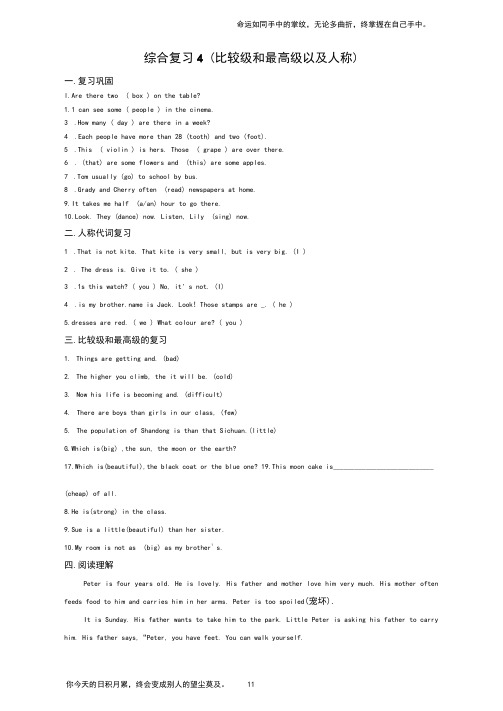
综合复习4 (比较级和最高级以及人称)一.复习巩固l.Are there two ( box ) on the table?1.1can see some ( people ) in the cinema.3.How many ( day ) are there in a week?4.Each people have more than 28 (tooth) and two (foot).5.This ( violin ) is hers. Those ( grape ) are over there.6. (that) are some flowers and (this) are some apples.7.Tom usually (go) to school by bus.8.Grady and Cherry often (read) newspapers at home.9.It takes me half (a/an) hour to go there.10.Look. They (dance) now. Listen, Lily (sing) now.二.人称代词复习1.That is not kite. That kite is very small, but is very big. (I )2. The dress is. Give it to. ( she )3.1s this watch? ( you ) No, it' s not. (I)4.is my is Jack. Look! Those stamps are _. ( he )5.dresses are red. ( we ) What colour are? ( you )三.比较级和最高级的复习1.Things are getting and. (bad)2.The higher you climb, the it will be. (cold)3.Now his life is becoming and. (difficult)4.There are boys than girls in our class, (few)5.The population of Shandong is than that Sichuan.(little)G.Which is(big) ,the sun, the moon or the earth?17.Which is(beautiful),the black coat or the blue one? 19.This moon cake is ____________________________ (cheap) of all.8.He is(strong) in the class.9.Sue is a little(beautiful) than her sister.10.My room is not as (big) as my brother1 s.四.阅读理解Peter is four years old. He is lovely. His father and mother love him very much. His mother often feeds food to him and carries him in her arms. Peter is too spoiled(宠坏).It is Sunday. His father wants to take him to the park. Little Peter is asking his father to carry him. His father says,“Peter, you have feet. You can walk yourself.“But mum always holds me in her arms/ say Peter unhappily.“Why do you have feet?”“When I am not happy, I kick my mother with them/ says Peter happily.( )1.Peter is a child.A.friendlyB.smallC.lovelyD.English( )2.Peter's spoils him very much.A.motherB.fatherC.parentsD.people( )3.Peter's father on this Sunday.A.is teaching him to walkB.is taking him to playC.is taking to himD.is carrying him to the park( )4. Peter ____ .A.doesn/t have feetB.doesn/t want to walkC.can not walkD.doesn/t want to go( )5.Peter kicks his mother when he is.A.happyB.walkingC.spoiledD.unhappy五.请用不少于10句话写出阅读绘本的心得或者复述故事。
香港朗文4A总结U1-U7
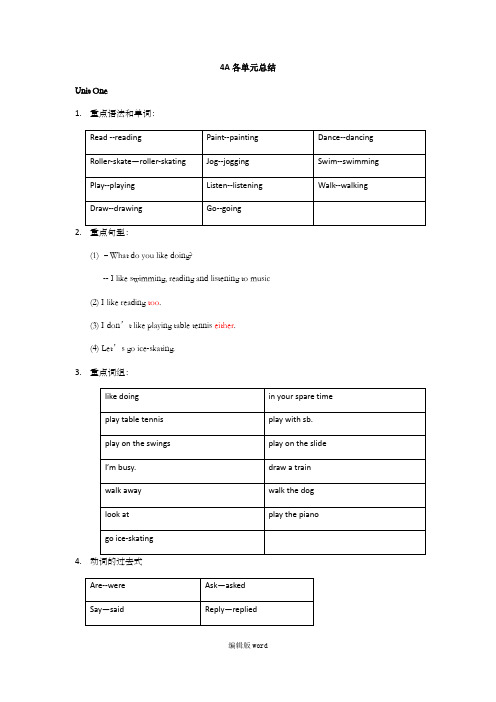
4A各单元总结Unit One1.重点语法和单词:2.重点句型:(1) –What do you like doing?-- I like swimming, reading and listening to music(2) I like reading too.(3) I don’t like playing table tennis either.(4) Let’s go ice-skating.3.重点词组:4.动词的过去式Unit two1.重点语法和单词:2.重点句型:(1)--Do you ever tidy your room?-- Yes, I usually tidy my room.(2)—Does she ever play the violin?-- No, she never plays the violin.-- No, she doesn’t play the violin.3.重点词组:4.动词的过去式Unit Three1.重点语法:2.重点单词和词组:3.重点句型:(1)--Was there any cola when you were young?-Yes, there was.(2)The game I like best was marbles.(3)How do you play marbles?(4)– Did you wear trainers fifty years ago?--Yes, I did.(5)—Did you have a telephone?-- No, I didn’t. Rich people had telephones at home but poor people didn’t.(6 ) – Did you shop at the supermarket?--- No, I didn’t. There weren’t any supermarkets.(7) – Did you go to school?-- No, I didn’t. Rich children go to school but poor children didn’t.(8) –Did you listen to the radio?-- Yes, I did.Where(哪里)do you like going to in your holiday?How(如何)do you help at home?How much (多少钱,提问不可数名词)is it? --- It is five dollars. How many (多少,提问可数名词)books in your home?What time(什么时间)is it?What(什么)are you doing now? ----I am doing my homework. What(什么)is the weather like today? ----It’s windy.What color (什么颜色)is it? ---- It is red.What (什么)are you? ( What do you do?) -----I am a driver.When(什么时候)is your birthday? ---on 2nd MayHow old(多大)are you? ----I am ten.Who (谁) are you? -----I am David.Which(哪一个) club do you want to join?Why(为什么)do you like playing football?----Because I like being healthy.Unit Four1.重点单词和词组:2.动词过去式:3.重点句型(1)How did people travel?——Most/Rich/Some people travelled by boat/sedan chair.(2)What did people wear?——Most/Rich people wore cotton clothes/silk clothes.(3)May I use your phone?(4)Why don’t you+动词原形(5)How do you want to send your letter?——By...... .(6)Were there any supermarkets?——No,there weren’t.Unit Five:1.重点单词词组2.单词过去式3.形容词比较级最高级4.重点句型(1)The horse, the camel and the giraffe are tall.The camel is taller than the horse.The giraffe is the tallest.(2)I’m stronger than all of you.Unit Six:1.重点单词和词组2.形容词比较级最高级3.重点句型(1)We visited some interesting places.The villages were more interesting than the temples.The islands were the most interesting.(2)Let me show you around my country.Let sb +do(动词原形)(3)Isn’t it big?——Yes, it’s huge.(4)Are we near your home yet?——Oh,no.It’s still a long way away.Unit Seven1.单词词组汇总2.过去式3.重点句型(1)The insects are busy today,aren’t they?——Yes,they are.(2)What are they?——They are......(3)Did you steal the matches?——Yes,I did.(4)Why did you fly off with the burning match?——Because I.......(此文档部分内容来源于网络,如有侵权请告知删除,文档可自行编辑修改内容,供参考,感谢您的配合和支持)编辑版word。
最新香港版朗文英语(welcome-to-english)4A第一课练习
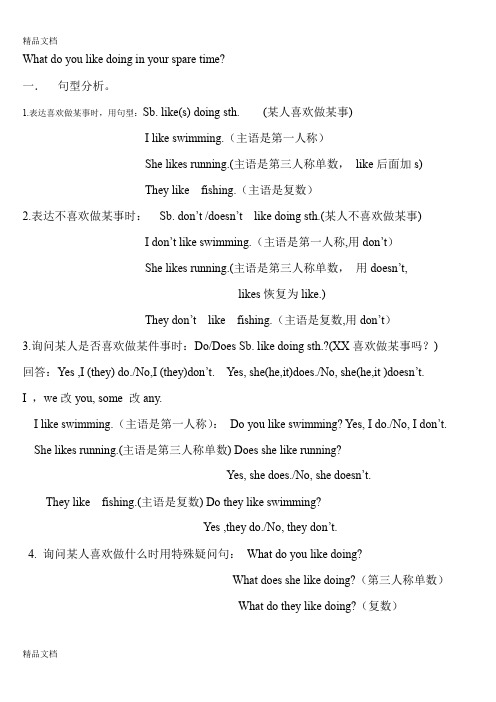
What do you like doing in your spare time?一.句型分析。
1.表达喜欢做某事时,用句型:Sb. like(s) doing sth. (某人喜欢做某事)I like swimming.(主语是第一人称)She likes running.(主语是第三人称单数,like后面加s)They like fishing.(主语是复数)2.表达不喜欢做某事时:Sb. don’t /doesn’t like doing sth.(某人不喜欢做某事)I don’t like swimming.(主语是第一人称,用don’t)She likes running.(主语是第三人称单数,用doesn’t,likes恢复为like.)They don’t like fishing.(主语是复数,用don’t)3.询问某人是否喜欢做某件事时:Do/Does Sb. like doing sth.?(XX喜欢做某事吗?) 回答:Yes ,I (they) do./No,I (they)don’t. Yes, she(he,it)does./No, she(he,it )doesn’t.I ,we改you, some 改any.I like swimming.(主语是第一人称):Do you like swimming? Yes, I do./No, I don’t. She likes running.(主语是第三人称单数) Does she like running?Yes, she does./No, she doesn’t.They like fishing.(主语是复数) Do they like swimming?Yes ,they do./No, they don’t.4. 询问某人喜欢做什么时用特殊疑问句:What do you like doing?What does she like doing?(第三人称单数)What do they like doing?(复数)一.填空。
香港朗文四年级4A第二单元达标练习题
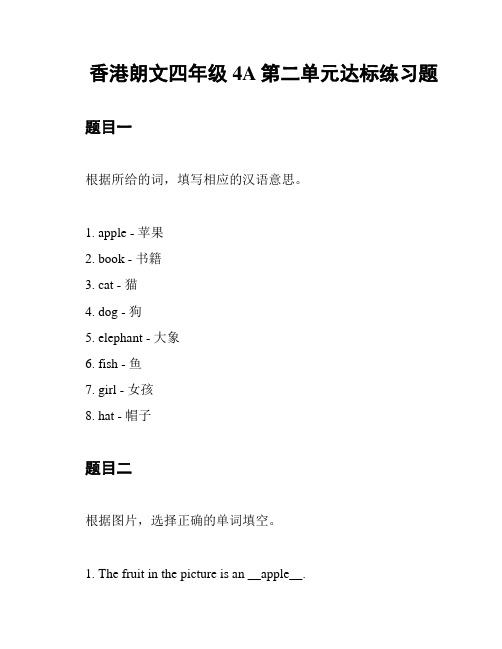
香港朗文四年级4A第二单元达标练习题题目一根据所给的词,填写相应的汉语意思。
1. apple - 苹果2. book - 书籍3. cat - 猫4. dog - 狗5. elephant - 大象6. fish - 鱼7. girl - 女孩8. hat - 帽子题目二根据图片,选择正确的单词填空。
1. The fruit in the picture is an __apple__.2. The object in the picture is a __book__.3. The animal in the picture is a __cat__.4. The animal in the picture is a __dog__. 题目三选择正确的单词填入句子中。
1. I have a pet __dog__.2. She has a cute __cat__.3. He likes to eat __fish__.题目四连线,将英文单词和图片相匹配。
题目五根据问题选择合适的答案。
1. What is your favorite fruit?a) appleb) catc) dogAnswer: __a)__ apple2. What is your favorite animal?a) bookb) catc) hatAnswer: __b)__ cat3. What do you read?a) fishb) girlc) bookAnswer: __c)__ book 题目六写出图片对应的单词。
Answer: __fish__Answer: __girl__Answer: __hat__以上为香港朗文四年级4A第二单元达标练习题,共计800字。
完整word版)香港朗文4A总结U1-U7

完整word版)香港朗文4A总结U1-U7 4A Unit SummariesUnit One:Key grammar and vocabulary:Read - readingRoller-skate - roller-skatingPlay - playingDraw - drawingPaint - paintingJog - joggingXXX - listeningGo - goingDance - dancingSwim - swimmingWalk - walkingKey XXX structures:What do you like doing?" - "I like swimming。
XXX."I like reading too." XXX."Let's go ice-skating."Key phrases:Like doing in your spare time Play table XXXPlay on the swingsI'm busyWalk awayLook atGo ice-skatingIrregular past XXX:Are - wereSay - saidGet - gotLeave - leftGo - wentThink - thoughtUnit Two:Key grammar and vocabulary:AlwaysXXXAsk - askedReply - repliedWalk - XXXPlay with sb.Play on the slideDraw a trainWalk the dogPlay the pianoUsuallyNeverXXXKey XXX structures:Do you ever tidy your room?" - "Yes。
香港朗文4A单词及句子xls
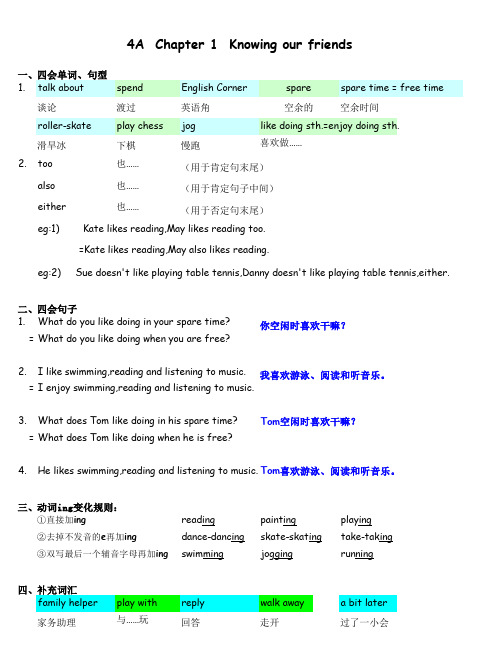
4A Chapter 1 Knowing our friends一、四会单词、句型1.talk about spend English Corner spare spare time = free time谈论 渡过英语角空余的空余时间roller-skate play chess jog like doing sth.=enjoy doing sth.滑旱冰下棋慢跑喜欢做……2.too也……(用于肯定句末尾)also也……(用于肯定句子中间)either也……(用于否定句末尾)eg:1) Kate likes reading,May likes reading too.=Kate likes reading,May also likes reading.eg:2) Sue doesn't like playing table tennis,Danny doesn't like playing table tennis,either.二、四会句子1.What do you like doing in your spare time?你空闲时喜欢干嘛?=What do you like doing when you are free?2.I like swimming,reading and listening to music.我喜欢游泳、阅读和听音乐。
=I enjoy swimming,reading and listening to music.3.What does Tom like doing in his spare time?Tom空闲时喜欢干嘛?=What does Tom like doing when he is free?4.He likes swimming,reading and listening to music.Tom喜欢游泳、阅读和听音乐。
三、动词ing变化规则:①直接加ing reading painting playing②去掉不发音的e再加ing dance-dancing skate-skating take-taking③双写最后一个辅音字母再加ing swimming jogging running四、补充词汇family helper play with reply walk away a bit later家务助理与……玩回答走开过了一小会solve puzzle sadly boring notes解决疑惑伤心地沉闷键盘piano slide swing钢琴滑梯秋千the youth center book dispiay central library 青少年活动中心书展中心图书馆sport centre City Hall city plaza体育活动中心市政厅市民广场4A Chapter 2 More about our friends一、四会单词和短语look after go to bed early late eat out get up 照顾,照看上床睡觉早迟外出用餐起床surf the Net play the recorder play the violin often sometimes always 上网吹直笛拉小提琴常常有时总是usually once twice never ever通常一次两次从不曾经二、三会单词polite same spilt(spill过去式)有礼貌相同的溢出angry invite friendly生气邀请友善的take photos cookbook wish拍照烹饪书希望三、四会句子1.Do you ever tidy your room?你曾经整理你的房间吗?yes,I usually tidy my room.是的,我经常整理我的房间。
香港朗文WTE 4A第三单元 词汇语法 知识点
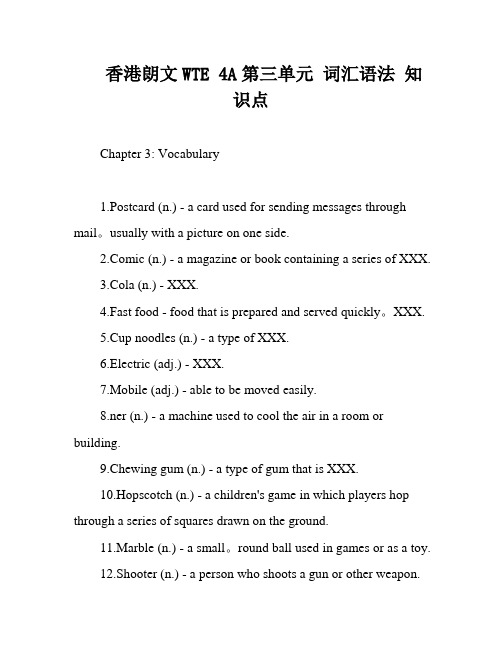
香港朗文WTE 4A第三单元词汇语法知识点Chapter 3: Vocabulary1.Postcard (n.) - a card used for sending messages through mail。
usually with a picture on one side.ic (n.) - a magazine or book containing a series of XXX.3.Cola (n.) - XXX.4.Fast food - food that is prepared and served quickly。
XXX.5.Cup noodles (n.) - a type of XXX.6.Electric (adj.) - XXX.7.Mobile (adj.) - able to be moved easily.8.ner (n.) - a machine used to cool the air in a room or building.9.Chewing gum (n.) - a type of gum that is XXX.10.Hopscotch (n.) - a children's game in which players hop through a series of squares drawn on the ground.11.Marble (n.) - a small。
round ball used in games or as a toy.12.Shooter (n.) - a person who shoots a gun or other weapon.13.Flick (v.) - to make a sudden。
XXX.14.Lose (v.) - to not win a game or XXX.15.Quiz (n.) - a short test or XXX.16.Trainer (n.) - a type of shoe designed for sports or exercise.17.Credit card (n.) - a plastic card used to make purchases on credit.18.(n.) - a device used for XXX.19.Rickshaw (n.) - a type of XXX.20.Oil lamp (n.) - a lamp that burns oil for light.21.Clog (n.) - a type of shoe with a thick wooden sole.22.Iron (n.) - a device used for XXX.23.Congee (n.) - a type of XXX.24.n (n.) - a public display of art。
最新香港朗文4A各单元知识要点 词汇语法
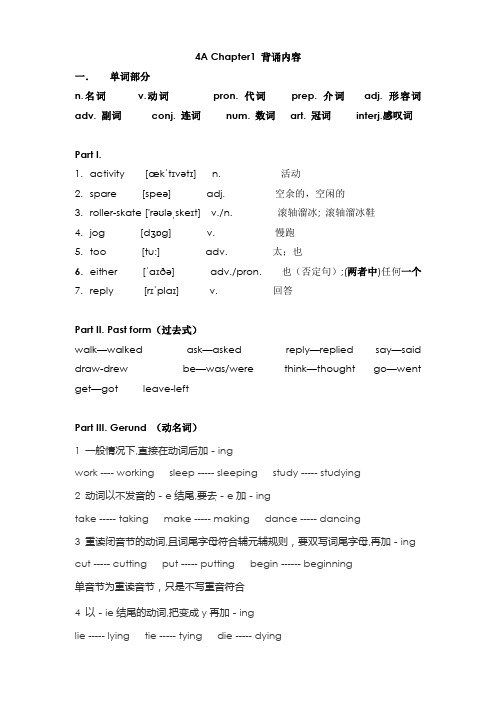
4A Chapter1 背诵内容一.单词部分n.名词v.动词pron. 代词prep. 介词adj. 形容词adv. 副词conj. 连词num. 数词art. 冠词interj.感叹词Part I.1.activity [ækˈtɪvətɪ] n. 活动2.spare [speə] adj. 空余的,空闲的3.roller-skate ['rəʊləˌskeɪt] v./n. 滚轴溜冰; 滚轴溜冰鞋4.jog [dʒɒg] v. 慢跑5.too [tu:] adv. 太;也6.either [ˈaɪðə] adv./pron. 也(否定句);(两者中)任何一个7.reply [rɪˈplaɪ] v. 回答Part II. Past form(过去式)walk—walked ask—asked reply—replied say—said draw-drew be—was/were think—thought go—went get—got leave-leftPart III. Gerund (动名词)1 一般情况下,直接在动词后加-ingwork ---- working sleep ----- sleeping study ----- studying2 动词以不发音的-e结尾,要去-e加-ingtake ----- taking make ----- making dance ----- dancing3 重读闭音节的动词,且词尾字母符合辅元辅规则,要双写词尾字母,再加-ing cut ----- cutting put ----- putting begin ------ beginning单音节为重读音节,只是不写重音符合4 以-ie结尾的动词,把变成y再加-inglie ----- lying tie ----- tying die ----- dying二.词组部分1.i n one’s spare time在某人的空余时间2.listen to (the) music 听音乐3.play chess 下棋4.like/love/enjoy doing 喜欢干某事5.go swimming (去)游泳6.go jogging (去)慢跑7.go roller-skating (去)溜冰8.be good at sth./doing 擅长于某事/干某事9.be poor at sth./doing 不擅长于某事/干某事10.be interested in sth./doing 对干某事/干某事感兴趣11.be afraid of sth./doing 害怕某事/干某事12.at/on the weekend 在周末at/on weekends13.on weekdays 在工作日14.be busy with sth. 忙于某事15.be busy doing 忙于干某事16.enjoy oneself= have a good time 某人玩得很开心17.a family helper 一位家庭帮手18.pick up kids 接小孩19.play the piano/violin 弹钢琴,拉小提琴(西洋乐器名词前加the )20.play Erhu 拉二胡(民族乐器前无the)21.play table tennis 打羽毛球(球类名词前无the)22.play on the swing/slide 在秋千(滑滑梯)上玩23.play with sb. 与某人一起玩24.play with sth. 玩耍某物25.a bit later 一会儿以后26.walk away sadly 难过地走开了27.walk the dog 溜狗28.walk home=go home on foot 走回家29.go home =go back home 回家30.after that 在那以后31.the black notes (钢琴上)黑键32.see sb. doing 看到某人在干某事33.make a new friend named Tom 交了一个叫汤姆的朋友34.in fact = actually/ˈæktʃʊəlɪ/事实上35.in the gym 在体育馆36.indoor stadium /'steɪdɪəm/ 室内体育馆37.finish sth./doing sth. 完成某事/干某事38.be important to sb. 对某人而言是重要的(绿色字体部分为拓展内容,供学有余力的小朋友默写。
- 1、下载文档前请自行甄别文档内容的完整性,平台不提供额外的编辑、内容补充、找答案等附加服务。
- 2、"仅部分预览"的文档,不可在线预览部分如存在完整性等问题,可反馈申请退款(可完整预览的文档不适用该条件!)。
- 3、如文档侵犯您的权益,请联系客服反馈,我们会尽快为您处理(人工客服工作时间:9:00-18:30)。
tidy your room
15.花...钱买...东西
spend (money) on sth
40.在盒子里
in the box
16.照顾某人
take care of sb
41.在橱柜里
in the cupboard
17.坐下
sit down
42.在抽屉里
in the drawer
18.骑马旅行
travel by horse
10.住在九龙
35.在秋季
11.住在(香港岛)
36.在上午
12.照看、照顾
37.在下午
13.好照顾某人/某物
38.在晚上
14.对...感到遗憾/对不起
39.在书包里
15.花...钱买...东西
40.在盒子里
16.照顾某人
41.在橱柜里
17.坐下
42.在抽屉里
18.骑马旅行
43.在森林里
19.开小气车去旅行
44.在丛林里
20.开灯
45.在公园里
21.关灯
46.在房间里
22.等某人/某物
47.在空中
23.醒来
48.匆匆忙忙
24.担心某人/某物
49.在公交车上
25.想做某事
50.在周日
51.在床上
70.外出吃饭
52.在地板上
71.起床晚了
53.在架子上
72.上网
54.在沙发上
73.快餐
55.在农场上
74.口香糖
56.在马路上
on the road
75.手机
mobile phones
57.在滑滑梯上
on the slide
76.棉布衣服
cotton clothes
58.在六月一日
on the first of June
77.丝绸衣服
silk clothes
59.在第一层
on the first floor
78.一顶轿子
a sedan chair
60.步行
on foot
79.金子银子
silver and gold
61.度假
on holiday
80.银票(纸币)
paper money
62.在左侧
on the left
81.一次(骑着)骆驼的旅行
a camel trip
63.在右侧
on the right
82.一次(坐着)直升机的旅行
43.在森林里
in the forest
19.开小气车去旅行
travel by car
44.在丛林里
in the jungle
20.开灯
tuБайду номын сангаасn on the light
45.在公园里
in the park
21.关灯
turn off the light
46.在房间里
in the room
22.等某人/某物
70.外出吃饭
eat out
52.在地板上
on the floor
71.起床晚了
get up late
53.在架子上
on the shelf
72.上网
surf the Net
54.在沙发上
on the sofa
73.快餐
Fast food
55.在农场上
on the farm
74.口香糖
chewing gum
32.在晚上
at night
8.喜欢做某事
like to do sth
33.坐汽车
by car / take a car
10.住在...
live in
34.坐公交车
by bus / take a bus
10.住在九龙
live in Kowloon
35.在秋季
in autumn
11.住在(香港岛)
live in Hong Kong Island
66.听音乐
67.照看你的宠物
68.早早地上床睡觉
69.整理房间
《朗文》词汇汇总4A综合复习(一)
班级________________姓名_________________
1.到校
come to school
26.在校
at school
2.害怕
frightened of
27.在家
at home
3.起床
56.在马路上
75.手机
57.在滑滑梯上
76.棉布衣服
58.在六月一日
77.丝绸衣服
59.在第一层
78.一顶轿子
60.不行
79.金子银子
61.度假
80.银票(纸币)
62.在左侧
81.一次(骑着)骆驼的旅行
63.在右侧
82.一次(坐着)直升机的旅行
64.在去...的路上
83.一次(乘着)小船的旅行
65下棋
《朗文》词汇汇总4A综合复习(一)
班级________________姓名_________________
1.到校
26.在校
2.害怕
27.在家
3.起床
28.在公园里
4.去度假
29.在圣诞节
5.去旅行
30.在六点钟
6.去骑车
31.在家
7.上床睡觉
32.在晚上
8.喜欢做某事
33.坐汽车
9.住在...
34.坐公交车
a helicopter trip
64.在去...的路上
on the way to
83.一次(乘着)小船的旅行
a boat trip
65下棋
play chess
66.听音乐
listen to music
67.照看你的宠物
look after your pets
68.早早地上床睡觉
go to bed early
36.在上午
in the morning
13.照看、照顾
look after
37.在下午
in the afternoon
13.好照顾某人/某物
look after sb / sth
38.在晚上
in the evening
14.对...感到遗憾/对不起
be sorry for
39.在书包里
in the bag
get up
28.在公园里
at the park / in the park
4.去度假
go on holiday
29.在圣诞节
at Christmas
5.去旅行
go on a trip
30.在六点钟
at six o’clock
6.去骑车
go on a ride
31.在家
at home
7.上床睡觉
go to bed
wait for sb /sth
47.在空中
in the sky
23.醒来
wake up
48.匆匆忙忙
in a hurry
24.担心某人/某物
worry about sb / sth
49.在公交车上
on a bus
25.想做某事
want to do sth
50.在周日
on Sunday
51.在床上
on the bed
